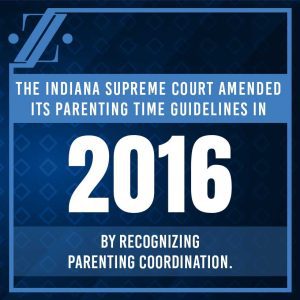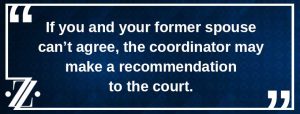
Reaching a mutually agreeable arrangement for spending time with children can be one of the most challenging aspects of co-parenting after a divorce. In Indiana—especially in contentious situations—the court may order parents to work with a parenting coordinator to resolve their disputes. A parent coordinator will help you meet at a middle ground.
What Is a Parenting Coordinator?
An Indiana parenting time coordinator is a neutral party, usually a lawyer or mental health professional, with special training. They help improve

In 2016, the Indiana Supreme Court amended its Parenting Time Guidelines by recognizing Parenting Coordination. Parenting coordinators weren’t new to Indiana, but those guidelines included specific rules stipulating that the court may order parents to work with one. The new rules also require parent coordinators to be registered domestic relations mediators or have a court waiver for their appointment and become registered within two years.
What Are the Benefits of Working with a Parenting Coordinator?
Simply put, parenting coordinators can reduce conflict. Working with a parenting coordinator allows you to devote less energy and attention to disagreements with your former spouse so you can focus on your children’s welfare. In addition, litigating parenting decisions in the court can be very expensive and time-consuming, while parenting coordinators can often render decisions more expeditiously. Lastly, parents share costs for parenting coordinators.
When the court orders divorced parents to work with a parenting coordinator, they will specify their scope of authority and responsibilities. If the court appoints one without the consent of both parties, it must provide a written explanation as to why it is necessary.
What Is the Process for Working with an Indiana Parenting Time Coordinator?
If you and your former spouse work with a parenting coordinator, either by choice or by a court order, this is the process you can expect:
- During an initial meeting, all parties introduce themselves and explain their issues and conflicts.


- The parenting coordinator may schedule individual meetings with each party through an established communication method, such as phone, Zoom or another virtual platform, or in person.
- Once you and your former spouse agree on the parenting guidelines, the parenting coordinator will create a written document for both of you to sign.
- Either party can object to the recommendation.
- If you and your former spouse can’t agree, the coordinator may make a recommendation to the court.
- The court can approve or deny the recommendation or take no immediate action.
The parenting coordinator’s primary responsibility is to the court, and your children, and to minimize conflict and resolve disputes as quickly as possible. However, you won’t lose your decision-making agency. They will listen to both parents, so you will have an opportunity to have your say.
What Are the Limitations of a Parenting Coordinator?
Although parenting coordinators can be very effective in helping former spouses resolve parenting issues, they are not judges, so they have some limitations:
- They can’t resolve financial matters such as child support.
- They can’t modify child custody or serve as a custody evaluator.
- They can’t make substantial changes to the percentage of parenting time.
- The process isn’t confidential, so there is no therapist-client or attorney-client privilege.
- Parenting coordinators must report child abuse, neglect, or any criminal activity that can adversely affect their ability to do their job.
Zentz Law – Compassionate Family Law Attorneys
The experienced attorneys at Zentz Law understand the stress associated with parenting following a divorce. We will fight every step of the way to ensure the best possible outcome for you and your children. Call us today at 317-220-6056 to let us know how we can help!
***Please note: This page is not intended to give specific legal advice but is meant for information purposes only. Contact us to discuss your case***

